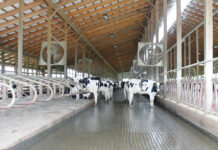UNIVERSITY PARK, Pa. — Sometimes huge initiatives start with modest efforts.
That may be the case with the oilseed press being operated as a demonstration project by Farm Operations and Services in Penn State’s College of Agricultural Sciences.
Pressing oil primarily from crops being grown by Penn State on university land near the University Park campus, the college is using the apparatus to gain experience in the operation of a community, or regional-sized, oilseed press, according to Glen Cauffman, manager of farm operations and facilities.
“Since the press first was started in February 2009, approximately 2,100 gallons of vegetable oil have been pressed,” he said. “Canola has been the major crop pressed, with sunflower and camelina also being pressed in smaller amounts.”
The sunflower and camelina seed both were grown here at Penn State. The canola either was grown at the university or acquired from Penn State Cooperative Extension’s oilseed program in northwestern Pennsylvania.
Growing operation
Pressed vegetable oil currently comprises about 9 percent of the 20,000 or so gallons of fuel used by Farm Operations and Services vehicles and equipment.
“We have yet to get into full-scale biodiesel production,” said Douglas Schaufler, the project engineer who is the primary operator of the oilseed press and oversees Penn State’s Biodiesel Initiative.
The program also involves collecting approximately 15,000 gallons of used vegetable oil annually from dining-hall and hospitality-services fryers on campus. That product is then blended with petroleum diesel to make fuel for vehicles and equipment from both Farm Operations and Services and the university’s Office of Physical Plant.
Goal
“The ultimate goal is to press the oilseed to make fryer oil for the dining halls, then gather the used vegetable oil to make it into biodiesel, which can fuel the tractor that helped produce the seed,” Schaufler said.
“Then we have food and fuel from the same crop. That’s where we hope we are headed. When we do reach full-scale biodiesel production, it will offset tens of thousands of gallons of petroleum diesel fuel currently purchased annually to operate the university’s vehicles and equipment.”
The Kern Kraft press is capable of pressing all types of oil crops — from the small seeds of camelina to the much-larger seeds of soybeans and tree nuts, Schaufler noted.
“A press of this size is rated at 88 pounds of seed pressed per hour,” he said. “Depending on the type of seeds, this can yield upwards of four gallons per hour of oil.”
The rate of oil production can depend on a number of factors besides the type of seed, such as seed quality and the desired extraction efficiency.
“Our experience has shown there is no problem with extracting a 55-gallon drum of oil in a 24-hour period, and greater production rates are easily possible.”
Pellets. After the vegetable oil is extracted, the remaining part of the seed is formed into compact pellets a little more than one-fourth inch in diameter and 2 to 3 inches long.
These pellets, or “meal,” have value as an animal feed, being high in protein and other necessary nutrients, Cauffman noted.
“Depending on the oil content of the seed type, the amount of oil and amount of meal will vary,” he added. “For canola, approximately a third of the seed is pressed into oil, and the remaining two-thirds (by weight) becomes the meal.”
Penn State’s College of Agricultural Sciences has been experimenting the past few years with running tractors and other farm equipment on various mixes of biodiesel (a diesel-fuel alternative processed from virgin or used vegetable oils) and straight vegetable oil.
So far, so good. “We’ve had no problem related to the fuel, no problem using biodiesel,” Cauffman said.
So far, growing, harvesting, pressing and blending biodiesel has not been a money-saving initiative for the College of Agricultural Sciences, conceded Schaufler. But the effort likely will prove its value in several ways in the future.
“When fuel costs were much higher more than a year ago, we had many inquiries about vegetable oil and biodiesel,” he said. “Since the downturn in the economy and subsequent lower energy prices, we haven’t fielded nearly as many questions. My guess is that when the price of fuel increases, we’ll hear many more questions about using straight vegetable oil in vehicles and equipment.”
Penn State is now recommending, encouraging and promoting the use of biodiesel as an alternative fuel that will improve the environment with lower emissions, reduced particulates and fewer problems caused by the exhaust, Cauffman said.
“We want to show farmers and agricultural producers that producing and using their own biofuels is really possible,” he added.
Related links:
WPSU’s Renewable & Alternative Energy [YouTube] Cellulosic ethanol plant opens in Tenn. Midwestern BioFuels pelletizes switchgrass in Kentucky









